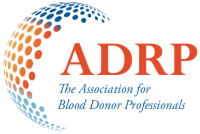Notifying donors when their deferral is ending: An effective donor retention strategy
Full article available for purchase in link provided
Authors
Carley N. Gemelli, Amanda Thijsen, Nina Van Dyke, Sarah P. Kruse, Tanya E. Davison
Abstract
Background
The application of a temporary deferral often leads to donor lapse. Contributing factors may be donors not knowing when their deferral ends or not being contacted and asked to return. The aim of this study was to determine the effectiveness of a reminder message notifying donors that their deferral is coming to an end in increasing donors’ postdeferral return rates. We evaluated the optimal time, content, and mode of delivery of the reminder message.
Study Design and Methods
Two studies were conducted with deferred donors. Study 1: donors (n = 1676) were randomized to be sent a reminder message at one of three time points (4 weeks before, 1 week before, and 1 week after their deferral ended) or to a no contact control condition. Study 2: donors (n = 1973) were randomized to three message type conditions (emotive email, nonemotive email, nonemotive SMS). Attempted return behavior was extracted (appointments, attendances) at 1 month.
Results
In Study 1, being sent the reminder message increased odds of donors attempting to return within 3 months compared with the control group (OR:2.01). Sending the reminder 1 week before the deferral ended was the most effective time point. In Study 2, the nonemotive message increased the odds of attempting to return compared with the emotive message (OR:1.38). No differences were found between email and SMS messages.
Discussion
Sending a reminder message to donors when their deferral is coming to an end is a simple, effective, and cost-effective method to retain donors.
August 5, 2021
Related Resources
Engaging blood donors as advocates Social media preferences and associations with marketing
Background: Various critical medical procedures would become impossible without blood donations—saving lives in emergencies, surgeries, and chronic conditions like thalassemia. Therefore, it seems crucial to enhance donor recruitment and ensure…
Rethinking the role of older donors in a sustainable blood supply
INTRODUCTION Many countries, particularly high human development index countries, are facing the challenge of an aging population.1 For Blood Collection Agencies (BCAs) in these countries, an aging population poses two…


